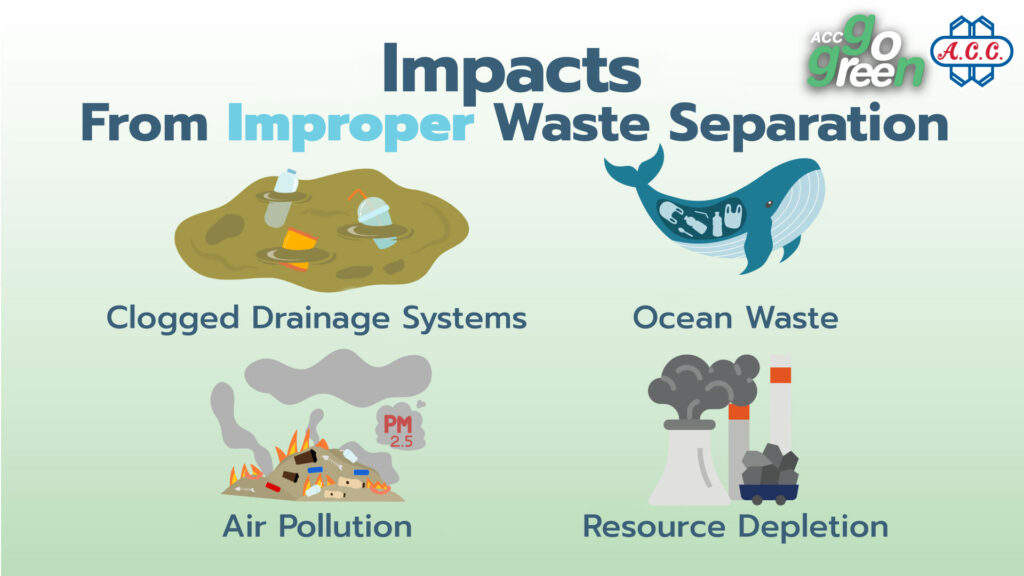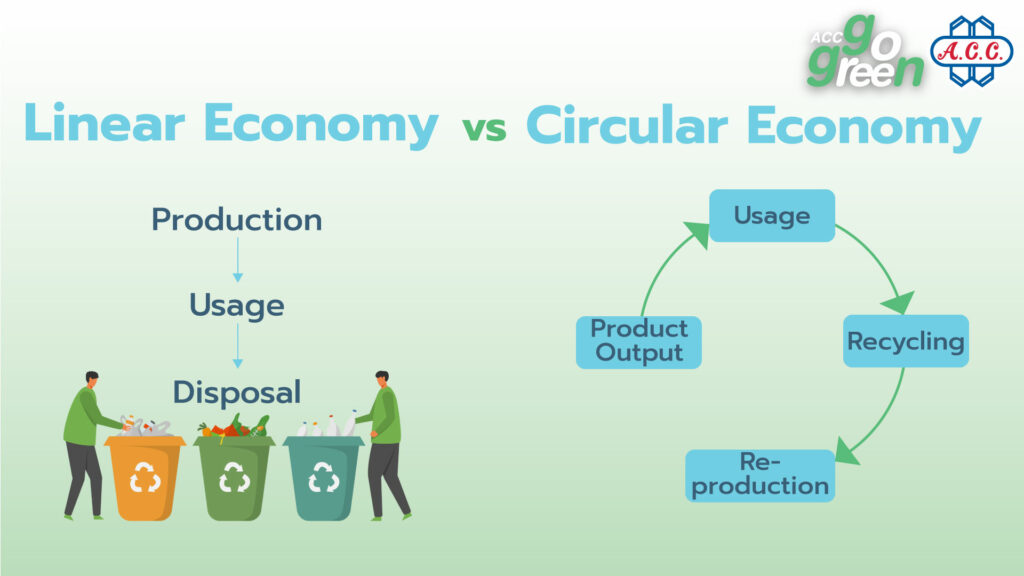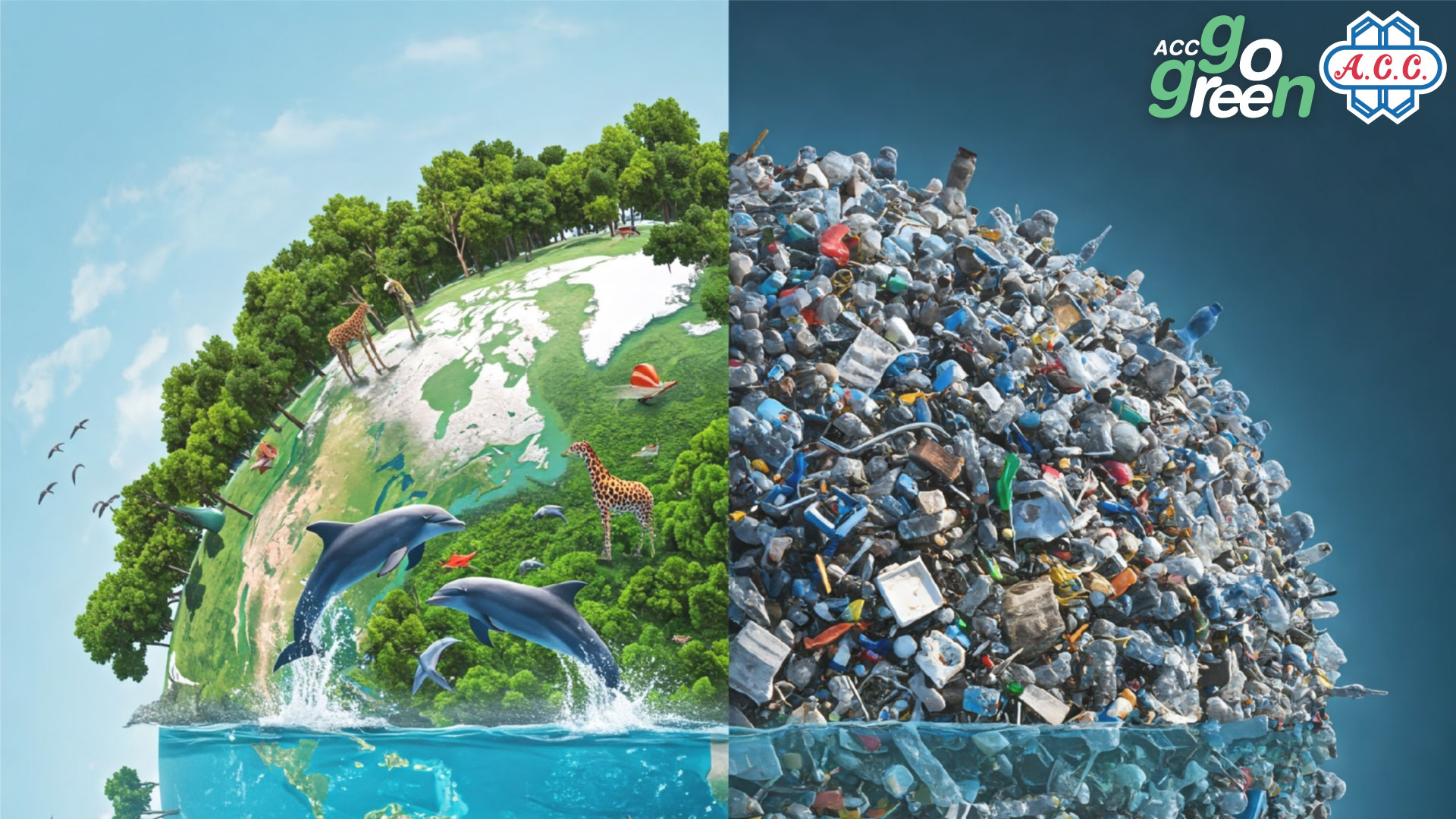The issue of plastic waste has become a significant global concern, as plastic is a material that is difficult to decompose, severely impacting the environment and ecosystems. Effective plastic waste management is therefore essential in creating sustainability for our planet.
In the current era, the problem of plastic waste has become an environmental crisis that the world must face. There are still over 1.5 million tonnes of plastic waste that have not been repurposed. Despite efforts to campaign for public awareness of the importance of waste separation, many people still do not prioritise it or do it incorrectly, leading to the accumulation of plastic waste and severe environmental impacts.
Impacts of Incorrect Waste Separation on the Environment
Waste separation is a fundamental step in effective waste management. However, in reality, many Thais still dispose of all types of waste into the same bin, especially mixing food waste with general waste, making it difficult to sort waste before recycling or disposal. Plastic waste contaminated with food scraps or liquids cannot be recycled, resulting in the need for disposal through landfilling or incineration, which causes environmental pollution.
-
Blockage of Drainage Systems
Plastic waste that is improperly discarded often flows into drainage systems, causing blockages and leading to urban flooding, especially during the rainy season.
-
Pollution in Water Sources and Seas
Plastic waste that is not properly disposed of often flows into rivers, canals and seas, affecting aquatic ecosystems. Aquatic animals may ingest plastic waste, leading to the accumulation of microplastics in the food chain and ultimately impacting human health.
-
Increase in Greenhouse Gases
Disposing of plastic waste through open burning or improper landfilling results in the release of greenhouse gases, such as methane and carbon dioxide, which are major causes of global warming.
-
Loss of Resources and Energy
Recyclable plastic waste that is mixed with other waste cannot be reused, necessitating the use of resources and energy to produce new plastic, which is a waste of natural resources.

The Importance of Plastic Waste Management
Plastic waste that is not properly managed can cause pollution to soil, water and air. Additionally, it affects wildlife and marine life. Reducing the amount of plastic waste and managing it appropriately is something all sectors should collaborate on.
Guidelines for Effective Plastic Waste Management
-
Education and Awareness
Activities or projects should be organised to educate the public about the importance of waste separation and correct methods, to foster understanding and awareness in practice. This includes creating an efficient recycling system and promoting the use of products made from recycled materials.
-
Reducing Single-Use Plastics
Avoiding the use of single-use plastics, such as plastic bags, straws and plastic packaging, can significantly reduce the amount of plastic waste.
-
Reuse
Reusing plastic products, such as water bottles, cloth bags and food containers, helps reduce the demand for new plastic production and decreases waste generation.
-
Recycle
Separating plastic waste from other types of waste and recycling it into new products helps reduce waste volume and the use of natural resources in new plastic production.
-
Use of Bioplastics
Bioplastics made from natural materials, such as corn starch or sugarcane, are environmentally friendly alternatives, as they decompose more easily and reduce reliance on fossil fuels in plastic production.
-
Sustainable Packaging Design
Developing packaging that uses fewer materials while maintaining strength and efficiency, such as lightweight packaging, helps reduce resource use and plastic waste.
Sustainable Solutions for Plastic Waste Management
The concept of a Circular Economy has become widely discussed in recent years, especially in the context of plastic waste management, as it emphasises the efficient use of resources, waste reduction, and the reintegration of materials into the production system, rather than discarding them as waste.
Unlike the Linear Economy system, which uses resources to produce, consume, and discard, the Circular Economy concept aims to close the loop of material use so that waste becomes new raw materials, especially plastic, which can be reused multiple times if properly managed.

Linking the Circular Economy with Plastic Waste Management
-
Product Design from the Source (Design for Circularity)
For example, packaging that is easy to disassemble or products made from 100% recycled materials, to enable practical reuse in the future.
-
Deposit Return Scheme
Many countries have a system for returning plastic bottles to facilitate easier recycling, which not only helps reduce waste but also incentivises public participation.
-
Creating Markets for Recycled Products
If there is no market demand for products made from recycled plastic, sorted waste may lack economic value. Supporting businesses to use recycled materials is therefore another important mechanism.
-
Businesses as Key Players
Many major brands, such as Unilever, Nestlé or Coca-Cola, have started to move by setting goals for all packaging to be recyclable by 2030, indicating a new trend towards transitioning to a global Circular Economy system.
Plastic and the Circular Economy in Thailand
Thailand has begun to push related policies, such as the Plastic Waste Management Roadmap 2018–2030, which clearly states the goal of promoting the use of Circular Economy principles, especially recycling plastic to achieve 100% by 2027 and eliminating unnecessary single-use plastics.
Although there are still various obstacles, such as waste separation infrastructure or unclear markets for recycled materials, laying the foundation for a Circular Economy system is an important step in sustainably reducing plastic waste.
Roles of Various Sectors in Plastic Waste Management
-
Government Sector
There should be policies and laws that promote the reduction of plastic usage, recycling, and the use of environmentally friendly alternative materials.
-
Private Sector
Companies and organizations should develop sustainable products and packaging, as well as promote recycling and the use of environmentally friendly materials.
-
General Public
There should be awareness and behavioral adjustments in plastic usage, such as reducing the use of single-use plastics, waste separation and supporting environmentally friendly products.
Conclusion
Proper waste separation is a crucial step in managing plastic waste and reducing environmental impact. Neglect or improper waste separation results in the accumulation of plastic waste and causes various problems that affect the environment and human health. Therefore, plastic waste management is a shared responsibility of all sectors in order to reduce environmental impact and create sustainability for our planet.
Sources:
• Plastic Waste Management Action Plan — Pollution Control Department
• Waste Reduction through the 3R Concept: Reduce, Reuse and Recycle — Technology Media


